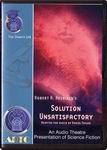
 The World Set Free
The World Set Free
By H.G. Wells; Read by Shelly Frasier
1 MP3-CD or 6 CDs – Approx. 6.5 Hrs [UNABRIDGED]
Publisher: Tantor Media
Published: 2002
ISBN: 1400150108 (MP3-CD); 1400100100(CDs)
/ Science Fiction / Atomic Power / Atomic Bombs / War / Utopia / Politics / Futurism / Prophecy / World State /
“Never before in the history of warfare had there been a continuing explosive; indeed, up to the middle of the twentieth century the only explosives known were combustibles whose explosiveness was due entirely to their instantaneousness; and these atomic bombs which science burst upon the world that night were strange even to the men who used them.”
The Father of Science Fiction first works are still among our classics. With excellent treatments of alien invasion (The War of the Worlds), space travel (First Men in the Moon), proto-genetic manipulation (The Island of Dr. Moreau), and of course time travel (The Time Machine). In his first decade of a writer he had written these classics as well as The Invisible Man, and The Food of the Gods, as many classic short stories.
Wells continued his writing career for another 40 years. Always remaining a popular author. So what happened to all these books he wrote? What happened to this iconoclast of SF? Why were his later works seldom reprinted and so hard to find? In his day, books like Tono-Bungay and Ann Veronica were huge critical and commercial successes. Thanks to Project Gutenberg and other public domain sites, his more obscure works are now obtainable. Much of his later work does not qualify as SF. But there are a number of his novels that deal with prophecies and future utopias and do qualify as SF.
The World Set Free was one of those future visions. Written and published upon the cusp of World War I, the novel proves that Wells had a gift for prophecy, although many of the details played out in a different way. In the novel the World War would not occur till 1956.
The main impetus of the novel is the advent of atomic power, both as a bomb and as a power source. The atomic bomb has many similarities to the actual bombs, including decaying radiation. Wells’ portrait of a World War would lead to numerous atomic bombs destroying civilization.
Wells had hoped from the ashes of a World War that nationalism would dissolve and a new world state would evolve. He portrays the World War in a horrific way. For one who saw the war as a way to a new world order, he does not handle the horrors of war with kid gloves.
Wells uses a narrative device that this book is written from a far utopian future. And from this far future perspective, it tells of the dark days of the war and then of the end of countries and the beginning of the world state. The tone is scholarly and leaves the listener/reader distanced from the characters.
I believe Wells started to see himself as an educator to the masses. That through his writing, both fiction and non-fiction, he could change the world. Sounds like a maniacal delusion, but he was an extremely popular writer. He was the equivalent to a rock star in terms of cultural popularity, but with the intellectual clout of an author. Unfortunately this didactic charge, he placed on himself, put storytelling subordinate to the message. Despite these flaws, the novel is filled with many thought provoking ideas.
Shelly Frasier narrates the novel. After an introduction, in which she speaks with an American accent, she switches to an English accent for the text of the novel. After getting use to this change, I found her accent and characterization quite good and she turns in a solid performance.



 The
The  The
The 
 The Man In The High Castle
The Man In The High Castle